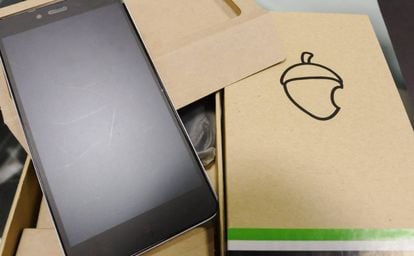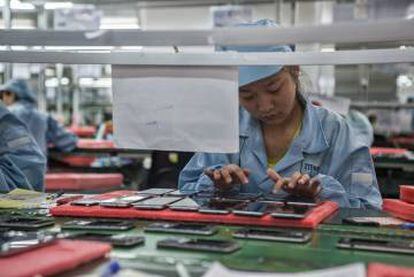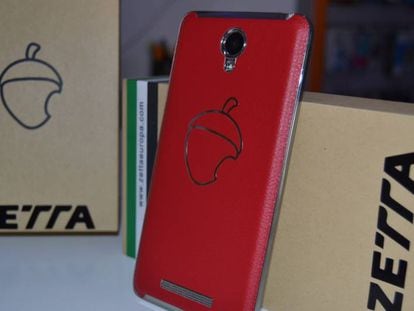How Spain’s Zetta passed off Chinese smartphones as its own
Xiaomi was surprised to learn that two of its models were being sold by Spanish company

Chinese smartphone manufacturer Xiaomi says it knew nothing about the existence of Zetta Smartphone, a Spanish company that allegedly bought Xiaomi handsets and relabeled them for sale in Spain, passing them off as made in the western region of Extremadura.
Xiaomi representatives told EL PAÍS they have no commercial ties with the makers of “the iPhone from Extremadura,” so called because the high-end mobile devices came with similar features to Apple products, but were being sold at much lower prices.
The only reason I see for doing something like this is pure laziness
Representative for Chinese OEM
The Chinese firm did not authorize the resale or manipulation of its cellphones, whose MIUI operating system had been altered to show Zetta’s logo, an acorn with a bite taken out of it (a nod to the oak forests of Extremadura and a reference to the Apple symbol).
Furthermore, Xiaomi says that it has no agreement of any kind with any company in Western Europe to commercialize its products there. Since its creation in 2010, the Beijing-based phone maker has been prudent about its expansion outside China.
Xiaomi’s vice-president for international markets, Hugo Barra, said that its globalization strategy has focused on “countries with large populations and low smartphone penetration,” such as India or Brazil.
The company’s phones are already on sale in Singapore and Taiwan because of social and cultural similarities with China, and the company has its sights set on the United States next. But there is no date for a European launch yet, says Xiaomi.
Zetta’s Chinese co-founder
This is not the first time that the business ethics of one of Zetta’s founders, Chinese national Cui Bojun, have come under scrutiny. Sources at China’s Alibaba, the world’s largest e-commerce company, said that Cui once tried to illegally register the brand name of the company’s international branch, Aliexpress, as well as its Spanish version Aliexpress España.
Alibaba is one of the main global channels to purchase Xiaomi phones.
For now, Xiaomi has not said whether it is planning any legal action against Zetta, but it is unlikely given the small amount of phones the Spanish company sold, and the fact that the Chinese company does not have a presence in Spain.

Zetta is thought to have sold around 1,200 units, compared to Xiaomi’s global sales of over 70 million phones last year.
However, the news came as an unpleasant surprise at Beijing headquarters, where employees are busy with the launch of the Mi Note 2, a phone that is expected to consolidate Xiaomi as a major player in the high-end handset market.
Zetta allegedly took two of the company’s lower-end phones, the RedMi and the RedMi Note 2, and added €100 to their original price after concealing the original Xiaomi logos and renaming the handsets Conquistador 4.7 and Conquistador 5.5 Plus.
In its two-year existence, Zetta expanded quickly across Spain, celebrated as a success story in Extremadura, one of the country’s most economically depressed regions. Its founders met with the regional premier last year and were interviewed on the regional television station, where they compared their products with the iPhone 7.
The case has also drawn attention from Spanish entrepreneurs living in China.
“It would be very ironic if Spanish companies were now imitating Chinese firms, given that many Chinese companies got started by copying western products ” said one auto industry entrepreneur.
Zetta sold around 1,200 units compared with Xiaomi’s global sales of over 70 million phones last year
Some Chinese phone makers offer generic handsets that foreign firms can customize and legally resell in their own markets under any name they choose. This method, which lets the purchasing company choose the specs, is also cheaper than buying each unit at retail prices, which prompts the question as to why Zetta did not take the simpler route to selling Chinese-made smartphones.
“Taking into account the fact that each unit is going to be a lot more expensive for them, the only reason I see for doing something like this is pure laziness,” said a representative for an Original Equipment Manufacturer – a company that makes parts for another company’s products – based in Shengzen, the heart of China’s electronics industry. “This way they didn’t have to worry about production issues.”
English version by Susana Urra.












































